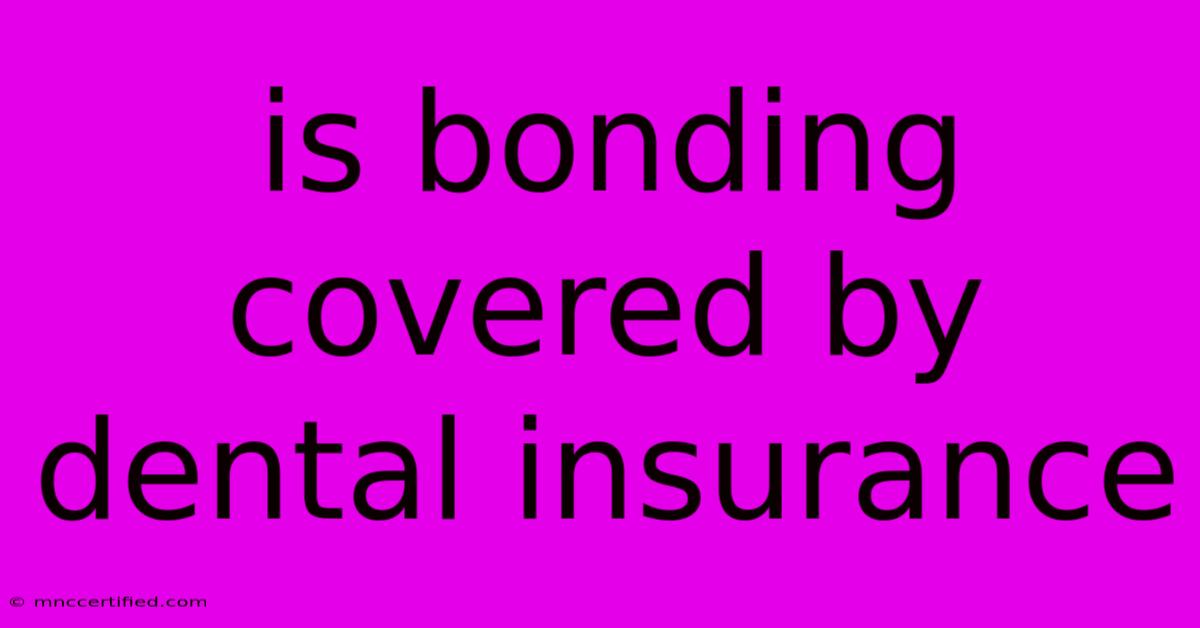Is Bonding Covered By Dental Insurance

Table of Contents
Is Bonding Covered by Dental Insurance? A Comprehensive Guide
Dental bonding is a popular cosmetic procedure that can fix chipped, cracked, or discolored teeth. It involves applying a tooth-colored resin material to the affected tooth, then hardening it with a special light. However, many people wonder if dental insurance will cover the cost of this procedure.
The short answer is: It depends.
Factors Determining Coverage
Dental insurance plans vary greatly in their coverage and benefits. Here are some key factors that influence whether bonding will be covered:
- Your specific insurance plan: Some plans may have limitations on cosmetic procedures, including bonding.
- The reason for bonding: If bonding is used to repair a tooth damaged due to an accident or injury, it might be covered as a restorative procedure. However, if it's solely for cosmetic reasons, coverage is less likely.
- Your deductible and co-pay: You might still need to pay a deductible and co-pay, even if the procedure is covered.
- The dental provider: Not all dentists are in-network with every insurance plan. If your dentist is out-of-network, you may receive lower coverage or have to pay a higher out-of-pocket cost.
How to Find Out About Coverage
To find out whether your dental insurance covers bonding, here's what you can do:
- Contact your insurance provider: They will have the most up-to-date information on your specific plan's coverage for bonding.
- Review your policy documents: Check the policy booklet or online resources for details on covered procedures and limitations.
- Ask your dentist: They can also provide information about your insurance plan's coverage.
Tips for Maximizing Coverage
- Choose an in-network dentist: Working with a provider within your insurance network can help you avoid higher out-of-pocket costs.
- Explore alternative options: If bonding isn't covered, consider other treatment options like veneers or crowns, which may be covered under your plan.
- Ask about pre-authorization: Some insurance plans require pre-authorization for certain procedures, including bonding. This can help ensure coverage and prevent unexpected bills.
Conclusion
Whether or not dental bonding is covered by insurance depends on many factors. It's essential to thoroughly review your policy and contact your insurer or dentist to determine your specific coverage. While bonding may not always be covered, understanding your options and exploring alternatives can help you make informed decisions about your dental care.

Thank you for visiting our website wich cover about Is Bonding Covered By Dental Insurance. We hope the information provided has been useful to you. Feel free to contact us if you have any questions or need further assistance. See you next time and dont miss to bookmark.
Featured Posts
-
You Tube Star Danny Aarons Meets Tennessee Thresher
Nov 09, 2024
-
Putin Seeks To Manipulate Trumps Actions
Nov 09, 2024
-
Weekend Rugby South Africa Vs Ireland And Nz
Nov 09, 2024
-
Graham Norton Show Latest Episodes And Interviews
Nov 09, 2024
-
Is Ohio A No Fault Auto Insurance State
Nov 09, 2024